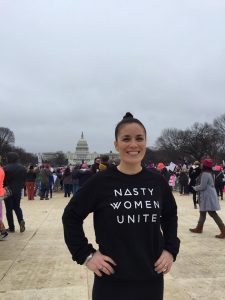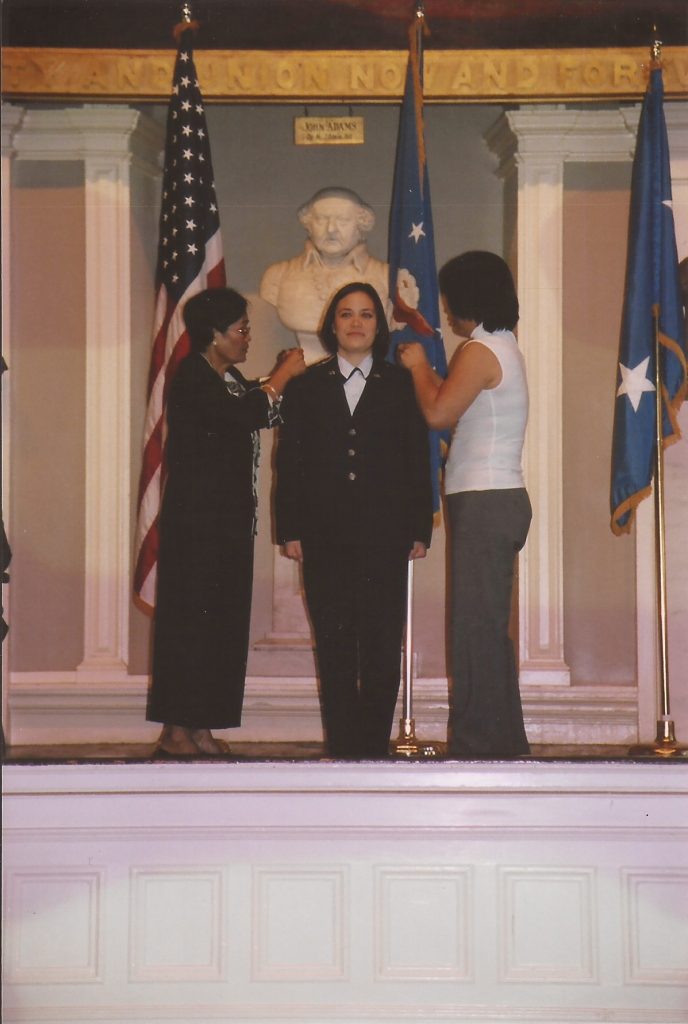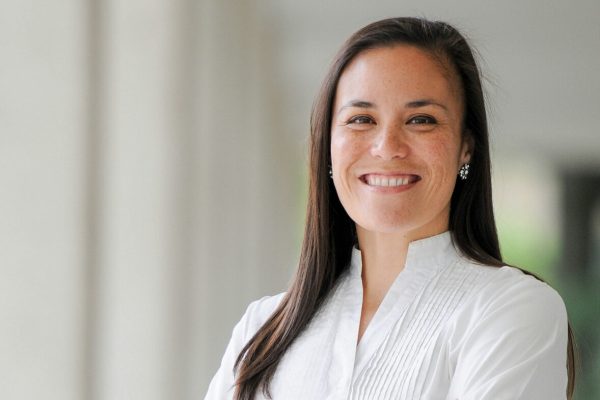Today’s political climate and the actions of this administration have made it hard to watch the news or feel motivated to do much more than despair. Thankfully, some have been pushed to action. Among them is former Air Force intelligence officer Gina Ortiz Jones in San Antonio, Texas. The first generation Filipino-American and open lesbian is challenging sitting U.S. Representative Will Hurd for the 23rd Congressional District.
We caught up with Jones to find out why she is running, how the race is going, and discuss the issues she is most passionate about.
Tagg: How is the campaign going so far?
Jones: I think the campaign is going well. I’m encouraged, you know. Folks are ready for new leadership, new blood, and I have a career in public service. I think folks are excited about someone with my background, the emphasis on public service, and serving at this time, you know, given what we’re up against right now.
Tagg: Tell me a little bit about your public service record.
Jones: First of all, I was fortunate to receive an ROTC scholarship. My country and community invested in me and it allowed me to get a quality education. I went to Boston University, and there are few things as scary for a Texas kid than going to school on the East Coast and finding out that there is no football team, but that’s what happened
I started off in the Air Force as an intelligence officer; I served under Don’t Ask, Don’t Tell. I was honored to serve my country. I think everybody, if they have the opportunity to do so, should find a way to do so. I was in the Air Force shy of three years. My mother became ill, and I decided to come back to San Antonio. There I worked with, I’m still working, on national security issues. I advised on operations in Latin America, and then I was invited to be part of the initial team that would advise on operations in Africa. My last assignment in the U.S. government was working in the Executive Office of the President.
I see it as kind of the next front line in terms of how we understand our economic and national security. I was honored to work there on trade enforcement but then also reviewing foreign transactions that are coming into the country and reviewing those for national security implications. So that’s been my career, you know, so I know hard national security but I’ve also been fortunate to work on what I understand to be the next frontier of our challenges which is our economic international security.
And I will, if you don’t mind, take a little bit more time to talk about the service that I do my own community because I think that’s super important. I think me being from San Antonio, me being first generation, me going to school like the one that I went—where you start off with 900 but you graduate with 500—I think that shapes you and it forces you to think about the importance of public service in a completely different way. So that’s why I’m very proud of the scholarship that I started at my high school. It recognizes folks that are doing well in the classroom, that’s kind of the basics, but who’s also taking that extra step to give back to the community and in that process develop their own leadership skills. That was certainly a critical experience for me when I was in high school, so if there are young people that are doing that today, I want to recognize them and do my part to invest in their success.
Tagg: What’s the name of the scholarship?
Jones: Leadership Through Service Scholarship and it’s at John Jay High School.

Tagg: Tell us a little bit more about your platform and why you chose to run now?
Jones: If you don’t mind I’ll reverse how I answer those questions because I think if you understand the answer to the “why” question the platform just makes more sense. So the why is, I’m a first-generation American. I’ve been fortunate to receive investments from my country and community that allowed me to get an education, grow up healthy, and serve my country.
The last five-and-a-half months when I was working in the Executive Office of the President, I was seeing the direction of those policies, certainly ones that you and I have read about in the newspapers, but also ones that I could see on the horizon. Those policies work directly contrary to national security that I had just worked for 14 years on. But personally I saw many of those policies as directly attacking the opportunities that I had—just to grow up healthy, get an education, and serve my country. I also thought about how those policies would not only affect me in D.C. but I had to think about my own personal experience growing up in San Antonio and how that would affect kids and communities like the ones that I grew up in. So it just became increasingly difficult for me to not think about how I could serve my country and community in a different way and in a way that only I could, given what we’re up against now.
My platform is national security and I talked a little bit about what I’ve worked on. The other two pieces of my platform are the economy and healthcare. Some of these and policies that we’re seeing coming out of Washington, D.C., I think long term those will have national security implications. So I do, frankly, see national security implications when not enough kids have access to healthcare, when kids are not healthy enough, when kids are not prepared. Essentially, they are our pipeline of talent into public service. Whether that be the military, or our teachers, our firefighters, I certainly see the national security implications of some of those domestic policies.
Tagg: Healthcare is an issue that very disproportionately affects members of the LGBTQ community, specifically people of color. Is that an area that you would like or plan to focus on?
Jones: I am not just an LGBT person, I’m not just a person of color, and so to your point, I really very much see how some of these policies would effect certain communities disproportionately. But then you know you get something like rising income inequality and how that also impacts people’s access to healthcare as well as access to quality education. All these problems compound each other and disproportionately affect, communities of color and LGBT communities of color as well. So yes that is certainly something that I want you to look at because when I talk about protecting the opportunities that allowed me to go from most vulnerable to most promising, that applies to everybody. Everyone should have the opportunity to realize wonderful potential but then go on to serve their country. So that’s very much how I think about each of these issues. We can’t afford not to invest in all aspects of our community and that certainly includes LGBT communities of color and their access to healthcare.
Tagg: I’ve never been to Texas. I’m very much a northern girl, so Texas and much of the Gulf and Southern states are intimidate me because they aren’t necessarily known for tolerance. So as a member of the community, was your sexual identity part of what drove you to run? And as many other first generation, possibly LGBTQ-identified people in and around Texas see you on this national platform, what are your thoughts around that?
Jones: I want to be honest with you, I think Texas gets a bad rap on some of these issues. Gerrymandering has had real effects in the state on who is elected but also the effect essentially of those policies on deterring people from even showing up to voting booths. I think part of what we’re seeing is actually an expression of that. But I’m a proud Texan. San Antonio just elected Mayor Ron Nirenberg and he ran on a platform of inclusion and the importance of diversity. So I think what you’re seeing from Texas and Austin is much different than the reality on the ground.
But to your point, yes I think we are in a unique time and that certainly is why I felt called to serve in a different way and in fact the call to serve my own community in a way that I thought that I could.
I was talking to some local leaders and they asked me if I would run as openly out. And I said look, given what’s going on right now coming out of Austin and also what’s coming out of Washington D.C., I’m going to run as openly gay, openly first generation, openly veteran, openly Asian-American, openly everything. Right now is not the time to be closeted or be ashamed of who you are or who you love.

Tagg: You’ve read the news about the directive concerning transgender troops. As a veteran, what are your thoughts on this new directive to prevent perspective trans service members from being recruited and the changes to healthcare?
Jones:That happened after I’d already announced [my run for office] but that certainly highlighted for me the importance of pushing back when you can because I served in the military, I served under Don’t Ask Don’t Tell, so I know what it’s like. I frankly don’t know what it is to be trans but I do empathize with my brothers and sisters who are serving, who are already in harm’s way, and now have this added stress of not knowing whether or not they’re going to continue to serve. And frankly folks that have served know that it’s the greatest honor of your life to do that. So it’s just really unfortunate that this person who has never served, I don’t think any of its members of his family have served either, it’s hard to stomach that he would put people who are already in harm’s way in greater danger with this uncertainty. So I think it’s irresponsible, I think is harmful to our national security. Anyone that’s been in the military knows that if you’re oversee, if you’re serving and one person on the team isn’t 100 percent then that whole unit is not 100 percent which means the mission is at risk. That’s ultimately what this comes down to for me.
I think you now is not the time for us to be limiting ourselves in terms of access to talent. If you’re healthy enough, if you’ve got the qualifications to be able to serve we should welcome you with open arms. And that’s not just to the military. I mean that’s the intelligence community that’s our teachers, everyone. It’s irresponsible the actions that these folks are making and it seems to be based on nothing other than misguided hate.
That’s what’s coming out of D.C. but let’s not forget about the recent vote in the House, where House members, including the person I’m looking to replace, voted to deny currently serving transgender members access to medical care only because they’re transgender. So that’s some of the hypocrisy that we’re dealing with here. You can’t talk about the importance of national security and take active steps like that to harm our national security. So you know we there’s certainly a lot to discuss with what Trump is doing but let’s not forget about that same hate that is motivating some of the votes that we’re seeing in Congress.


